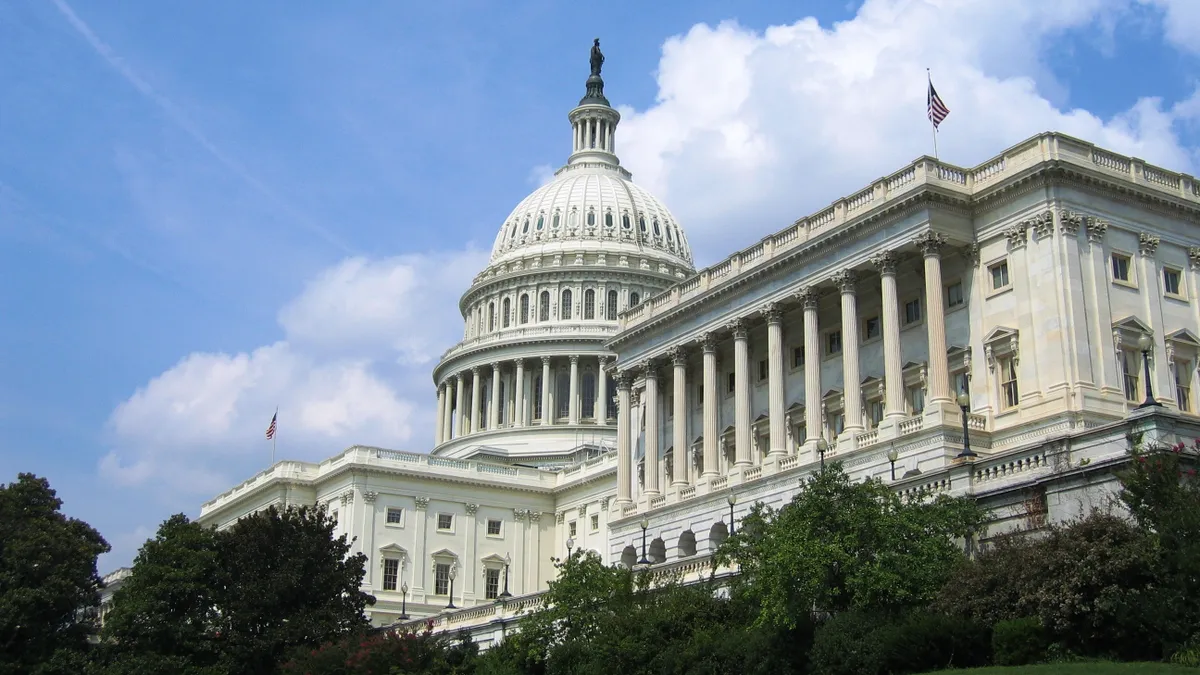Dive Brief:
- President Trump's two nominees to the U.S. Equal Employment Opportunity Commission (EEOC) voiced support for employee compensation data collection and promised to rework and replace now-halted EEO-1 pay reporting requirements in a timely manner. The pair made their positions clear during their Sept. 19 confirmation hearing.
- Janet Dhillon and Daniel Gade also both said they were personally opposed to workplace discrimination based on sexual orientation and gender identity, but declined to fully stand behind EEOC’s position that Title VII prohibits such discrimination. When pressed, Gade said he wouldn’t seek to change the EEOC’s position absent clear legal reasons to do so. Dhillon, however, promised only to review the issue and consult with commission staff.
- The nominees also told lawmakers that redoing the commission's regulations on wellness programs would be a priority.
Dive Insight:
Dhillon’s and Gade’s confirmation hearing gave employers a first look at how they might proceed if confirmed by the Senate.
As expected, the pair spoke about the need for EEOC to strike a balance between enforcement efforts and education efforts. And their apparent unease with the commission’s position on Title VII isn’t likely to have broad, unexpected implications for employers either. The U.S. Supreme Court may resolve that debate soon and employment law attorneys continue to recommend that employers include LGBT employees in EEO policies, regardless of the outcome of this narrow legal question.
The nominees’ commitment to replacing the halted EEO-1 pay reporting requirements, however, could certainly have an impact on employers’ day-to-day operations. Commissioner Chai Feldblum previously told HR Dive that she believes the commission is legally required to submit an update to the White House’s Office of Management and Budget. In its memo staying the provisions, the office says that federal regulations “require EEOC to submit a new information collection package for the EEO-1 form to OMB for review.”
A representative from the business community, however, says the requirement to resubmit applies if EEOC wants to use the revised EEO-1. The commission must resubmit the expanded EEO-1 with data included that better demonstrates "how the form is consistent with [federal law’s] burden, utility, and confidentiality requirements if EEOC wants that form to be cleared and put into effect,” said Marc Freedman, the U.S. Chamber of Commerce’s executive director of labor law policy. “Accordingly, whether and when EEOC resubmits this form is anything but clear.”
It remains to be seen what a replacement would entail (Dhillon called the original version “unnecessarily burdensome”) or what its timeline might look like. An EEOC Federal Register announcement instructs employers to refrain from completing the form’s pay information section “until further notice.” And at their confirmation hearing, lawmakers only asked Dhillon and Gade to commit to resubmitting the form “in a timely manner,” which they did.
Feldblum said that she personally will “fight very hard within the Commission for us to go back to the drawing board on the pay data collection and craft something that will be useful for employers, employees and the Commission.”
But if that happens, the employer community may very well put up its own fight. (The Chamber says it was instrumental in getting OMB to block the first form.) Freedman said that “[i]f the commission decides to pursue a second attempt on the revised form, I’m sure we will be active.”
For now, employers only need to worry about the EEO-1's usual reporting requirements. The permitted snapshot periods for the remaining requirements begin Oct. 1 and forms are due March 31, 2018. Generally, employers with 100 or more employees must file the EEO-1, although some smaller federal contractors must do so as well.













